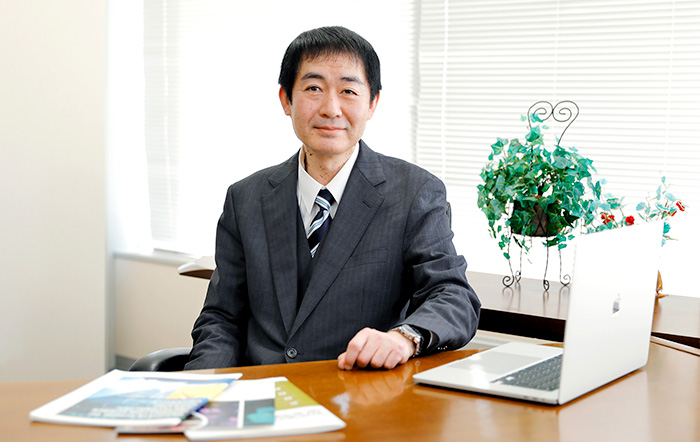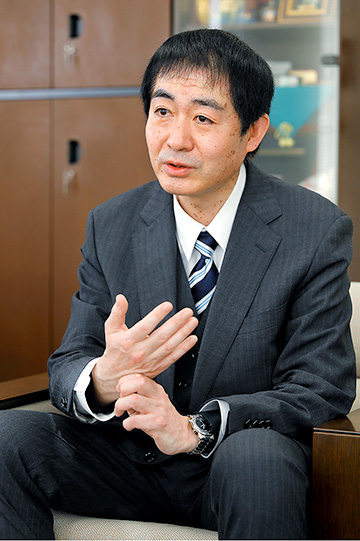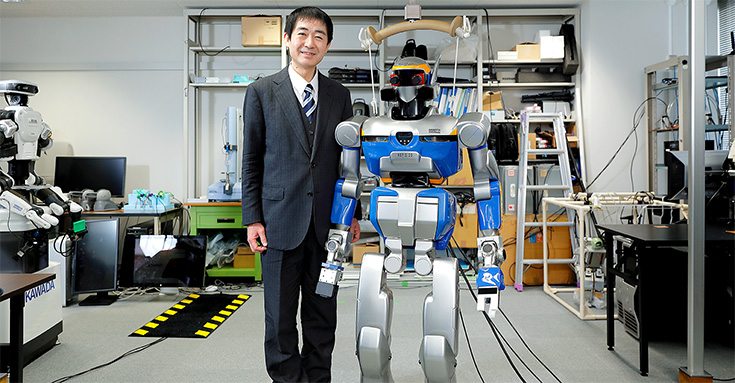
Message
Creating a future far beyond the imagination while experiencing the joy of researching and developing new technologies
Graduate School of Information Science and Technology
Faculty of Information Science and Technology
ProfessorKonno, Atsushi
Information science moves back and forth between real and cyberspace to make society richer, more convenient, and safer
A remarkable characteristic of information science in recent years is the ability of information to freely move between cyberspace and real space and to operate in real space. For example, a car navigation system uses Global Positioning System (GPS) to detect where the car is traveling, matches the information with a map, and guides the driver to the optimal route. On railways, when an earthquake occurs, an early earthquake detection and warning system detects the earthquake and applies the emergency brake on a Shinkansen running near the epicenter. In the medical field, surgical navigators can help with surgery by showing the doctor exactly where the location of the affected part is in the body.
Thus, today, sensors digitize information from real space and incorporate it into cyberspace, and computers search for optimal behavior in cyberspace and operate in real space by guiding humans or directly driving machines. Information science is making society richer, more convenient, and safer with the advancement of technology. I think that will continue to be the case going forward.
A campus where many fields coalesce, and a network that spreads from the campus to the world
Developing new technologies is very exciting for researchers. This is especially true if the technology you create makes people’s lives richer, more convenient, and safer. The biggest mission of the Faculty of Information Science and Technology (research organization) and the Graduate School of Information Science and Technology (educational organization) is to create an environment where researchers can develop with excitement technologies that make people and society rich, convenient, and safe. The goal is to convey this excitement to students and to nurture human resources who have the capability to develop such technologies.

The Graduate School of Information Science and Technology has five courses; namely, Computer Science and Information Technology, Electronics for Informatics, Bioengineering and Bioinformatics, Media and Network Technologies, and Systems Science and Informatics. Not only information science experts, but also researchers from a wide range of fields, such as semiconductors, electrical and electronic circuits, life sciences, information media, information communication, and system integration, are gathered here. Located in the center of Hokkaido University Sapporo Campus, close to other faculties such as the Graduate School of Science, Engineering, Medicine, and Chemical Sciences, the Graduate School / Faculty of Information Science and Technology also actively conducts interdisciplinary research.
At the same time, the university has a diverse network of contacts both in Japan and overseas. Researchers from national research institutes such as the National Institute for Materials Science (NIMS), the Japan Aerospace Exploration Agency (JAXA), and the National Institute of Advanced Industrial Science and Technology (AIST), as well as from telecommunications carrier companies, provide lectures and research guidance as visiting faculty members in collaborative fields. In addition, researchers from the University of Massachusetts (UMass) and the University of Technology Sydney (UTS) participate as cross-appointment faculty in the Collaborative Center for Big Data and IoT (CCB) located at the Faculty of Information Science and Technology. The ability to take classes and receive research guidance from world-class researchers beyond the walls of Hokkaido University is a characteristic and strength of the Graduate School of Information Science and Technology.
We have been among the first to tackle fields that have been attracting a lot of attention recently. One of them is artificial intelligence (AI). In 2022, a series of image-generation AI and chat-based AI applications were launched, enabling AI to draw better than humans and to carry out advanced text conversations indistinguishable from humans. AI engineers are needed more than ever, and there is a demand for human resources who can develop next-generation AI technologies. At the Graduate School of Information Science and Technology, which is home to diverse researchers from Japan and overseas, students can learn not only about AI technology, but also acquire practical skills to solve social issues by applying AI technology to various fields.

The other is semiconductors. In October 2023, the university established the Semiconductor Center Formation Promotion Headquarters, which serves as a hub for industry, academia, and government to collaborate in the field of semiconductors. The Graduate School / Faculty of Information Science and Technology also participates as an education and research department within the university, contributing to the strengthening of education, research, and social cooperation systems in the field of semiconductors.
In addition, our university was selected for the High-level Grant under the Support Project for Strengthening the Functions of Universities and Technical Colleges by the National Institution for Academic Degrees and Quality Enhancement of Higher Education (NIAD-QE). With this, we increased the enrollment capacity of the Department of Electronics and Information Engineering, School of Engineering by 50 from FY2024 to 230. As the academic year progresses, the enrollment capacity of the graduate school will be increased from 196 to 229 students for the master's program and from 43 to 48 students for the doctoral program. The next few years will be a period of significant advancement for the Department of Electronics and Information Engineering, School of Engineering and the Graduate School / Faculty of Information Science and Technology, with many promising achievements in human resource development and R&D.
Universities and graduate schools are life-changing places for encountering diverse knowledge and interacting with colleagues from all over the world
Universities and graduate schools are places where you can experience life-changing encounters that will leave a lasting impact on your life. In today’s modern information society, if you have a computer or smartphone, you can access books, literature, and all kinds of information from all over the world. However, by interacting with faculty members, students, and international students from different countries in graduate school, and colliding with people from different cultures, you can gain experiences and ideas that you would not have thought of on your own. I think that is the significance of studying in graduate school.
Back when I was a child, it was thought that the era when computers surpassed humans in shogi and go was still a long way off. Now, however, we are far ahead of the future I had envisioned. Twenty years from now, the world may become even more advanced than what researchers and students can imagine today. I hope that all students belonging to the Graduate School of Information Science and Technology will encounter life-changing and exciting experiences and create a future that goes far beyond our imagination.

